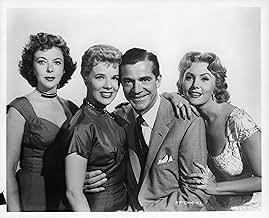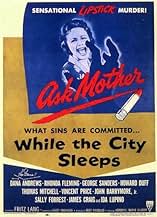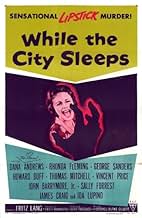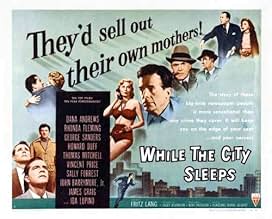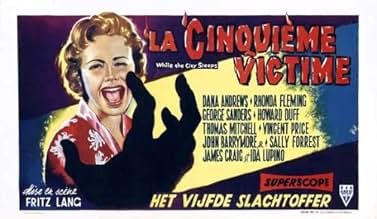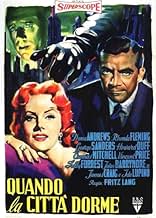Adicionar um enredo no seu idiomaA serial killer has been killing beautiful women in New York City and the new owner of a media company offers a high position in the company to the first of his senior executives who can get... Ler tudoA serial killer has been killing beautiful women in New York City and the new owner of a media company offers a high position in the company to the first of his senior executives who can get the earliest scoop on the case.A serial killer has been killing beautiful women in New York City and the new owner of a media company offers a high position in the company to the first of his senior executives who can get the earliest scoop on the case.
- Direção
- Roteiristas
- Artistas
- Robert Manners
- (as John Barrymore Jr.)
- Judith Felton
- (as Sandy White)
- Tim - Police Desk Sergeant
- (as Larry Blake)
- Mike O'Leary
- (as Edward Hinton)
- Direção
- Roteiristas
- Elenco e equipe completos
- Produção, bilheteria e muito mais no IMDbPro
Avaliações em destaque
I just thought it wasn't up to the lofty standard set by Lang in earlier films like 'M" and "The Testament Of Dr. Mabuse", but truth be told, these pictures were made many years before this one. Too much dialogue here, and this picture dearly needed an injection of excitement to break the tedium of the love stories in the sub-plot.
I like Dana Andrews, Thomas Mitchell, George Sanders, et al. A big boost was provided by Ida Lupino, always professional, as a sleep-around newspaper columnist. I also felt Barrymore tended toward ham in his portrayal of the psycho killer. My overall impression is of a master director who was losing his fastball, which is a shame. It could have been so much better.
5/10 - Website no longer prints my star rating.
Nice and entertaining thriller-plus with the emphasis on the reporters' ruthless methods of gaining information rather than on the killer's motivations. This engaging film contains murder thriller, plot twists , suspense and some far-fetched elements including plausible events. The movie is both a slick, smooth crime yarn and a jaded look at the morals of big-city newspapermen. This is a real critical on the American journalism; as this tale develops, a variety of submerged elements slowly surfaces to make this picture far more one of intrigue. It packs a memorable subway pursuit climax, though suffers only from having too many roles which throws meat to a hungry familiar cast. The movie was adapted from a novel, "The Bloody Spur" by Charles Einstein (1953), which in turn was based on a real murder case that took place in 1946. The picture ¨White the city sleeps¨results to be a classic film (1956) by Fritz Lang, a brilliant and masterly exposition in which Lang gets a first-hand view of the journalistic system, being finely starred by a great star-studded-cast. Acceptable acting from starring Dana Andrews, he is well cast in the impulsive main role, playing a writer who attempts to chase a series killer, while Sally Forrest as his girlfriend, but she seems a little long in the tooth in a role that called for more sparkle. And a good all-star-cast, such as: Rhonda Fleming , George Sanders, Howard Duff, Thomas Mitchell, Vincent Price, John Barrymore Jr, James Craig, Ida Lupino, Mae Marsh, and Robert Warwick.
It displays an adequate and atmospheric musical score by composer Herschel Burke Gilbert. Functional and evocative cinematography in black and white by Ernest Laszlo. This decent motion picture was compellingly directed by Fritz Lang who gets first-hand view of journalism. Here Lang completed 20 memorable years in Hollywood after a distinguished early career in the German cinema that incluyed such classics as Metropolis. Being one of Lang's last Hollywood movies and last big success, it has improved with age, although it still doesn't grip as it should, at times. This great German director Lang made various prestigious silent movies as ¨Metrópolis¨ , ¨Woman in the moon¨ , ¨Doctor Mabuse¨ , ¨Spies¨ , ¨Spiders¨ , ¨Nibelungs¨. And shot other excellent and classic films in all kinds of genres, such as: adventure movie as ¨Moonfleet¨ ; noir films : ¨Beyond a reasonable doubt¨, ¨While city sleeps¨ , ¨The big heat¨ , ¨Clash night¨ ; Drama : ¨Woman in the Window¨ , ¨Human Desire¨ , ¨Scarlet Street¨ , ¨Fury¨ ; Western : ¨Rancho notorious¨ , ¨Western Unión¨ , ¨Revenge of Frank James¨. Rating: 6.5/10. Better than average.
One of the men runs the newspaper, another the wire service, and the third's angle is to take advantage of an affair he's having with the new boss's wife (Rhonda Fleming). The first two men scheme away, determining when to broadcast information and when to hold it for maximum effect (and personal gain). They think about how to add little elements in the story, like referring to one of the victims as "the attractive librarian," in order to titillate readers. They also use personal connections in the police force in order to get direct access to information (and even watch interrogations). It all becomes a bit of a circus, and the tragedy of the murders is lost, which is of course the point.
The main character is another man, a reporter (Dana Andrews) who is not involved directly in the fray, but is doing a lot of the investigation into the murders. He's also involved in a relationship with a woman in the office (Sally Forrest), though their relationship wasn't all that inspiring to me. The real issue, however, is that his actions don't seem all that believable, e.g. Is he really going to speak directly to the killer over the airwaves in the way he does, divulging information like that? Use his fiancée as bait? Swing from getting engaged to immediately carrying on with Ida Lupino when she tempts him? And is the media really going to be tasked with solving the crime, instead of just reporting on it?
I think that to be a satire, it needed to be a little more believable, and I could have used a little bit more of a shift into the darkness of the crime itself. The ending also undermines the film's message, and it reminded me a teeny bit of Otto Preminger's critique of the justice system in 'Anatomy of a Murder' - not immediately obvious that the critique is the main point, and then an ending that seems a little off in tone.
I did like how Lang seemed to enjoy himself thumbing his nose at the production code. The affair between Fleming and Craig is crystal clear, and under the guise of telling her husband she's going to her mother's. Andrews makes it clear to Forrest that he thinks people should "find out" about each other before marriage, and Lupino later quips that all men are polygamists as she flirts with him. Before marveling at his Forrest's nightgown (a "shorty" that "you can see right through") Andrews will also say "Get your things off; it's your wedding day, you want to look nice," which had me chuckling. It makes the fact that the middle-aged married couple (Mitchell and his wife) appearing in separate beds when he's phoned in the middle of the night extra comical, and one can sense Lang was well aware of that.
Lang may have taken joy in all this and the subversive commentary about the wonders of a free press, but it's hard to fathom it being among his personal favorite films he made, particularly given his body of work. It's entertaining enough to watch though.
With an intriguing plot and an impressive ensemble approach with the casting, this film offered much and, although it could have been darker in tone, it still offered a lot of potential to be a slick urban mystery. The story is basically a mystery where a group of mercenary journalists compete for a top job by trying to catch a serial killer. Typical for this sort of thing, the journalists are all hard-talking and hard-drinking while still being likable rogues to a man; the driven edge they have offers much but the film doesn't follow through for example I was shocked by the idea of Mobley offering his own fiancé up as bait but disliked the way she treated it as a bit of a laugh and didn't respond convincingly. Likewise the story contains adultery and betrayal between the characters and while it hints at much it doesn't throw up as many ethical shadows as I felt it should be doing. Regardless of this the story is still good; the mystery aspect is not that interesting and, despite the fact people were being killed I didn't ever feel like it was a race against time or anything. What the story does better is to develop the various characters and draw the drama from their relationships and tensions.
For this reason the ensemble cast does pretty well and features a host of big names. Andrews is the lead of the group and he has a good presence although I would have liked him to be a little bit less likable and be as ethically questionable as his methods suggest he was. Sanders is not that great, mainly because his material is not as strong; conversely Craig is better because his material is more interesting. Price is good in his role and Mitchell provides good support and fits the newspaper editor stereotype. Fleming and Lupino are much better than Forrest, who is a bit weak when viewed alongside such actors. Barrymore, Warwick and others do well in smaller roles but the guy who played the Lipstick Killer was a bit of a pain as he seemed to relentlessly ham it up and skulk around all to obviously.
Overall though the film stands up and is an enjoyable ensemble drama with a bit of mystery tension. The actual race to find the killer is less of a draw than the tensions between the journalists and their partners and it never got as exciting as it should have done but it is still interesting. Viewers who like their noirs to be a bit murkier and darker may be disappointed to find that the script hints at darkness but also keeps everyone likable a failing I must admit bothered me because I could see the potential but other than this it is still worth watching.
1956's "While the City Sleeps" is a little less impressive but still highly entertaining. It stars some actors who had either seen better days in film or hadn't moved up the ladder much - Dana Andrews, Ida Lupino, George Sanders, Thomas Mitchell, Vincent Price, Sally Forrest, James Craig, and John Drew Barrymore. It's a '40s cast, and the film, set in New York City, has a '40s feel to it.
Andrews plays a Pulitzer-prize winning writer, Ed Mobley, an Ed Murrow type, who does a television commentary. With the death of the big boss of the media conglomerate - which includes a newspaper, television news, and a wire service - his waste of a son, Walter Kyne, (Price) takes over the company. He sets up a competition among the three heavy-hitters in the company - the newspaper editor John Day Griffith (Mitchell), the head of the wire service, Mark Loving (Sanders) and a news photographer Harry Kritzer (Craig). The first one who solves the "Lipstick Killer" murders wins the job as director of the company.
The black and white cinematography gives "While the City Sleeps" a great atmosphere, and some of the characters are a real hoot, including Lupino, who plays Mildred, a columnist for the paper, and Rhonda Fleming as Kyne's gorgeous wife who is having an affair with one of the contenders, Kritzer. Everyone drinks like a fish at a nearby bar, Mobley gets into trouble with his fiancé Nancy (Forrest) for kissing Mildred in a cab, and Kyne's wife is discovered in flagrante delicto due to a bizarre set of circumstances. Meanwhile, Griffith and Loving fight to be first and can't figure out why Kritzer doesn't seem to be trying very hard. Well, he is, just not at the paper. Nancy is set up (with her permission) as a target for the Lipstick Killer, who uses his delivery job to unlock apartment doors by pushing in the button, and then returns and kills his single female victim.
Though a little slow at times, "While the City Sleeps" is more of a newspaper story than a mystery, so there isn't a lot of suspense or excitement to be had. It's just good, old-fashioned entertainment. Recommended for a very good cast and decent story.
Você sabia?
- CuriosidadesThe movie was adapted from a novel; The Bloody Spur by Charles Einstein (1953) which was based on a real murder case that took place in 1946. In that year, William Heirens killed three women and left a message scrawled in lipstick on a bathroom mirror after the second murder. In the message, he urged the police to catch him before he killed again. Because of this, the press dubbed him "The Lipstick Killer".
- Erros de gravaçãoWhen Robert Manners (John Drew Barrymore, as John Barrymore Jr.) is watching Edward Mobley (Dana Andrews) on TV, he is clutching a copy of "Tales From The Crypt". When he drops it to the floor, a closeup of the comic book now shows it to be titled "The Strangler".
- Citações
Ed Mobely: You know, you have very nice legs.
Nancy Liggett: Aren't you sweet.
Ed Mobely: Nice stockings too. What holds your stockings up?
Nancy Liggett: There's a lot your mother should have told you.
Ed Mobely: I didn't ask my mother. I asked you.
- ConexõesFeatured in Histoire(s) du cinéma: Toutes les histoires (1988)
Principais escolhas
- How long is While the City Sleeps?Fornecido pela Alexa
Detalhes
- Data de lançamento
- País de origem
- Idioma
- Também conhecido como
- Mientras duerme Nueva York
- Locações de filme
- Empresa de produção
- Consulte mais créditos da empresa na IMDbPro
Bilheteria
- Faturamento bruto mundial
- US$ 7.652
- Tempo de duração
- 1 h 40 min(100 min)
- Cor


